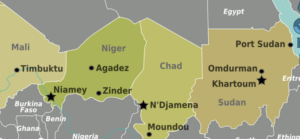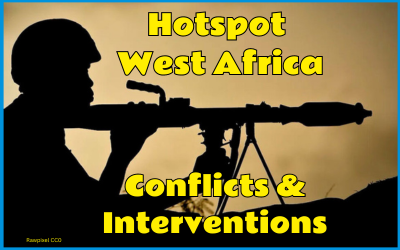The article below was published by AEFJN Brussels in the AEFJN Echo of June 2024. It gives some interesting perspectives on changes that have taken in place it the Sahel region of African as a result of which internal structures in African and external influences have been altered in ways that reflect global shifts in power.
While the world looks at the conflicts in Ukraine and Palestine, a new trouble spot has developed in West Africa as a result of a series of military coups, almost unnoticed by Western public opinion.
Military Coups in West Africa
In the last three years, the army has seized power in several West African countries: in 2021 in Mali and Guinea, in 2022 in Burkina Faso, and in 2023 in Gabon and Niger. The West African Economic Community of West African States (ECOWAS) and the international community condemned the acts of violence. In order to legitimise their coups, Mali, Niger and Burkina withdrew from ECOWAS and formed their own military alliance, the Alliance of Sahel States.

Peter Fitzgerald, amendments by LtPowers, CC BY-SA 3.0, via Wikimedia Commons
ECOWAS then suspended the sanctions and began negotiations with the coup plotters. In the meantime, the military governments had found a new partner for arms supplies and military co-operation: Russia, which is making great efforts to replace the traditional Western partner states in many countries in Africa.
The Failure of Democratic Systems
All three countries were among the nine states, which constituted the Federation of French Colonies in West Africa. Even after independence, France retained a major influence in its ex-colonies through a military presence and by using the political elites that were educated in France and characterised by French culture.
There were numerous military coups in many West African states from 1965-1985 until democratic governments were able to assert themselves in the 1980s. However, the hopes of the population for a noticeable improvement in their living conditions through the new democratically elected governments were mostly disappointed. The problems of glaring economic inequality, bottomless corruption among the leading elites and the lack of social services in education and healthcare remained. Gradually, democracy lost the support of the population.
Coup Plotters Welcome
There are several reasons why the population often welcomes the new military rulers. The hope is that they will improve their living conditions of the common people, an expectation that is most of time disappointed. There are also other historic reasons.
Even after decades of independence, France still maintained in many ex-colonies a military presence in order to support local governments which protect its own economic interests. This was perceived as an affront to national sovereignty. The first act of the new coup leaders in Mali, Burkina and Niger, to send the hated French home, was welcomed by the majority of their inhabitants.
The fact that often French companies are exploiting the mineral resources in these countries is perceived as a form of neo-colonialism. Instead, the new leaders prefer to bring Chinese or Russian investors into the country, who are not burdened by a colonial past. Niger’s military has withdrawn the licence to mine an estimated 200,000 tonnes of uranium from the French company Orano.
The German federal army participated in Mali with a total of 20,000 soldiers in both the European Union Training Mission (EUTM) from 2013-2023 training the Malian army and also in the UN’s MINUSMA mission to provide public security, stabilize the political system and ensure human rights.
Development Cooperation, a Dilemma
The acceptance of dictators by the population poses a dilemma for German development cooperation. It is committed to promoting human rights and should actually stop giving development aid to autocratic regimes. On the other hand, civil society is often the only force that can bring about democratic change. The challenge is therefore to strengthen democratically oriented civil society organisations without simultaneously supporting military regimes.
“Developments in the Sahel are too important for Europe and Germany to withdraw completely. After the end of the Bundeswehr mission in Mali, the German government should continue its diplomatic and development policy engagement in the region and work together with civil society organisations.”
Welt ohne Kompass, das Friedensgutachten 2024 ( World without a compass, the peace report 2024)
Source: https://friedensgutachten.de/

